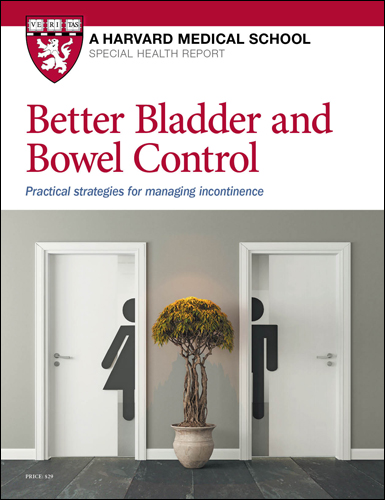Natural ways to relieve constipation
A few at-home tips can help you avoid the need for harsh laxatives.
We often make light of constipation, but it's no laughing matter. When you can't go to the bathroom for days on end, you feel bloated and miserable. Straining day after day can also lead to more serious problems, like hemorrhoids or even prolapse (bulging) of rectal tissue.
An estimated 40% to 60% of older adults regularly deal with constipation, although the aging process itself is not to blame. It's what goes along with aging. It's things like less physical activity, which helps the bowels move more regularly. It's the medications many older adults take.
Constipation causes
One of the biggest factors in constipation is diet. Eating high-fiber foods, such as raw fruits and vegetables and whole grains, helps to keep you regular. Drinking enough fluid is essential too. The fiber holds the water in the bowel so it can mix with the stool and make it softer.
If you're getting plenty of fiber and fluids and you're still not regular, one of these constipation causes may be to blame:
- medicines such as narcotic pain relievers, antidepressants, aluminum-containing antacids, blood pressure medications, drugs for Parkinson's disease, and iron supplements
- lack of exercise
- regularly ignoring the urge to have a bowel movement
- diseases such as diabetes or an underactive thyroid gland (hypothyroidism).
Getting going again
Laxatives may seem like the quickest and simplest solution, but they're not a good idea If people go right to stimulant laxatives, there is a risk that they'll become physically dependent on them.
Before taking any laxative, try these diet and lifestyle tips for managing constipation:
- Stay hydrated. Drink at least four to six glasses of fluids a day. Water and fruit juices are best for preventing constipation. Limit caffeinated beverages such as soda and coffee, which can actually leach more fluid from your body.
- Bulk up on fiber. Try to get at least 25 grams of fiber daily from your diet. Good food sources include Brussels sprouts, apples, figs, bran cereal, and black beans.
- Get on a daily schedule. The longer stool sits in your intestines, the harder it becomes, and the more difficult it is to push out. That's why having a regular bowel habit is important. Because the emptying reflex works best after a meal, a useful habit is to head to the bathroom after breakfast and see if you get the urge.
- Try not to strain. It could lead to hemorrhoids, anal fissures (tears in the skin around the anus), or rectal prolapse (when part of the intestinal lining pushes out through the anal opening). Add more fiber and fluid to your diet or try a stool softener to make bowel movements easier.
If you simply can't go and you want to try a laxative, start with the osmotic type (such as MiraLAX or Geri Care). The osmotic laxatives are reasonably safe. They work gently by pulling water into your intestines, making the stool softer and easier to pass.
If you've tried everything and you still aren't regular, see your doctor, who can evaluate you for a medical problem. Call your doctor right away if you have any symptoms of a bowel obstruction, which can include abdominal pain, vomiting, a swollen belly, or the complete inability to have a bowel movement.
Excellent food sources of fiber |
|
|
Food |
Grams of fiber per serving |
|
Split peas (cooked) |
16.3 |
|
Black beans |
15.0 |
|
Artichoke (cooked) |
10.3 |
|
Raspberries |
8.0 |
|
Bran cereal |
5.3 |
|
Oatmeal (instant) |
4.0 |
|
Apples (with skin) |
4.4 |
|
Brussels sprouts |
4.1 |
|
Figs (dried) |
1.6 |
Image: RealPeopleGroup/Getty Images
Disclaimer:
As a service to our readers, Harvard Health Publishing provides access to our library of archived content. Please note the date of last review or update on all articles.
No content on this site, regardless of date, should ever be used as a substitute for direct medical advice from your doctor or other qualified clinician.

















